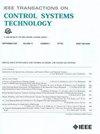自动驾驶自行车的稳健平衡和轨迹控制
IF 4.9
2区 计算机科学
Q1 AUTOMATION & CONTROL SYSTEMS
引用次数: 0
摘要
本研究的目的是构建一种能够在校园环境中自行平衡并自动跟踪指定轨迹的自动驾驶自行车。为了实现平衡,我们根据自行车的动态模型设计了一个低级控制器。它能使自行车实现横向稳定和转弯动作,并对速度变化具有鲁棒性。设计方法采用线性参数变化(LPV)方法,首先将动态模型分解为四个具有时变系数的线性子系统的凸组合,然后求解一组线性矩阵不等式(LMI)来计算鲁棒状态反馈的增益矩阵。在轨迹跟踪方面,采用类似的 LPV 方法设计了一个高级控制器。它允许自行车在给定路径上稳健地跟随预先生成的虚拟车辆运动,而不受虚拟车辆沿路径的速度和偏航率变化的影响。该控制系统在原型自行车上进行了数值和实验验证。实验结果表明,自动驾驶自行车能在校园内沿着测试路线行驶,均方根误差小于 18 厘米。本文章由计算机程序翻译,如有差异,请以英文原文为准。
Robust Balancing and Trajectory Control of a Self-Driving Bicycle
The purpose of this research is to construct a self-driving bicycle that can balance itself and automatically track a designated trajectory in campus environments. For balancing, a lower level controller is designed based on the dynamic model of the bicycle. It allows the bicycle to achieve lateral stability and cornering action with robustness to speed variations. The design methodology adopts a linear-parameter-varying (LPV) approach by first decomposing the dynamic model into a convex combination of four linear subsystems with time-varying coefficients and then solving a set of linear matrix inequalities (LMIs) to compute the gain matrix for robust state feedback. For trajectory tracking, a high-level controller is designed using similar LPV approach. It allows the bicycle to robustly follow a pregenerated virtual vehicle motion on a given path regardless of the speed and yaw-rate changes of the virtual vehicle along the path. The control system is verified both numerically and experimentally on a prototype bicycle. In particular, the experiment shows that the self-driving bicycle can follow the testing route in campus with rms error less than 18 cm.
求助全文
通过发布文献求助,成功后即可免费获取论文全文。
去求助
来源期刊

IEEE Transactions on Control Systems Technology
工程技术-工程:电子与电气
CiteScore
10.70
自引率
2.10%
发文量
218
审稿时长
6.7 months
期刊介绍:
The IEEE Transactions on Control Systems Technology publishes high quality technical papers on technological advances in control engineering. The word technology is from the Greek technologia. The modern meaning is a scientific method to achieve a practical purpose. Control Systems Technology includes all aspects of control engineering needed to implement practical control systems, from analysis and design, through simulation and hardware. A primary purpose of the IEEE Transactions on Control Systems Technology is to have an archival publication which will bridge the gap between theory and practice. Papers are published in the IEEE Transactions on Control System Technology which disclose significant new knowledge, exploratory developments, or practical applications in all aspects of technology needed to implement control systems, from analysis and design through simulation, and hardware.
 求助内容:
求助内容: 应助结果提醒方式:
应助结果提醒方式:


